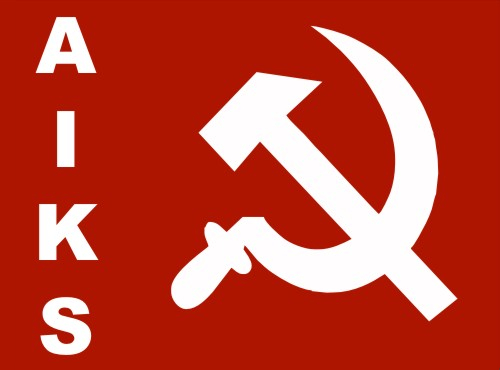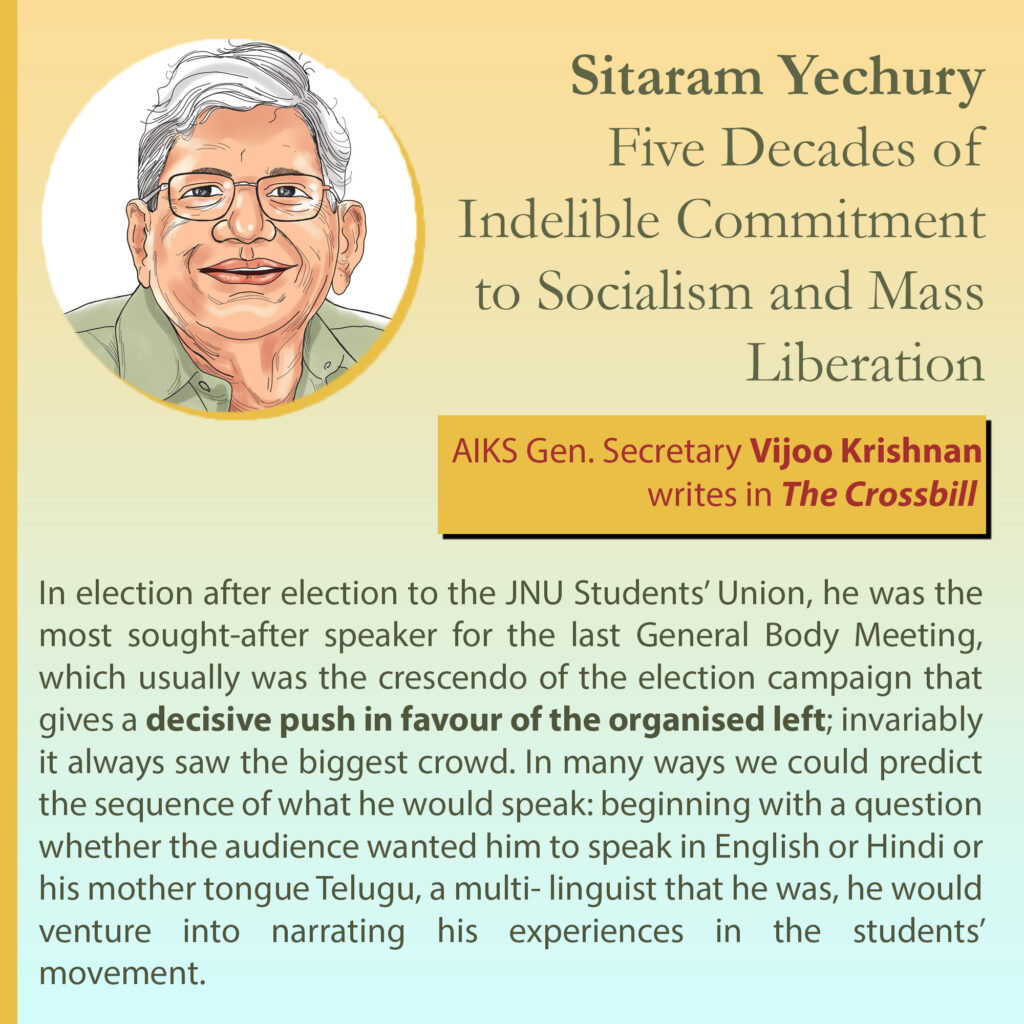READ: Sitaram Yechury, Five Decades of Indelible Commitment to Socialism and Mass Liberation: Comrade Vijoo Krishnan
Comrade Sitaram Yechury, General Secretary of the Communist Party of India (Marxist) has been one of the most recognised faces of the Left in India. In the last decade he has also been one of the most vocal opponents of the corporate-communal and authoritarian regime at the helm. Starting his political activism through the students’ movement in 1974 in the Students’ Federation of India, the next five decades of his life was one of an indelible commitment to socialism and the liberation of the masses.
It was in the turbulent years of the 1970s that his political ideas were sharpened. The humiliating defeat of US imperialism in Vietnam, the general anti-imperialist surge, the international solidarity with the resistance in Chile, the Palestinian Liberation Movement, the anti-Apartheid movement and heroic resistance of the Cuban people had all undoubtedly inspired the youth of his times. In the heyday of the authoritarian Emergency imposed by the Indira Gandhi led Congress Government he went underground organising resistance eventually being arrested in 1975. After the Emergency, he was elected as the President of the JNU Students’ Union thrice during a single academic year 1977–78, a distinction only he holds, which is testimony to his popularity as well as the strong presence of the Students’ Federation of India which he helped to build on the campus. He went on to be the all India President of the SFI in 1984-86. At a relatively young age of 32 he was inducted into the Central Committee of the CPI-M in 1984 and the next year into the newly formed Central Secretariat. He was elected to the Politbureau in 1992 at the fourteenth Party Congress.
His induction into the Polit Bureau was at a time of intense debate world over about the future of socialism and when in the wake of the collapse of Soviet Union there was talk of ‘end of history’ and triumph of liberalism. It was also at a time when the political right-wing under the leadership of the fascist RSS was on the ascendancy in India. He, along with the collective leadership, steered the CPI-M with an ideological clarity that could break the demoralisation and inspire hope in the cadre. His writings in this period on imperialism, the neoliberal economic policies, the communal forces as well as the Hindutva ideology are of great relevance. In the era of coalition politics in India, he played a significant role in formulating policies and the Common Minimum Programme especially when the first UPA Government was formed. During the first tenure of the UPA Government, the strength of the Left could be leveraged to ensure implementation of progressive legislations like the MGNREGA, Forest Rights Act, Right to Information Act etc.
As a Parliamentarian for 12 years, he came to be seen as one of the most effective voices against the communal-corporate BJP regime and also on many occasions put the Government in the dock. On issues of the working class, the peasantry and oppressed people he was an inspiring presence both in the Parliament as well as on the streets. In particular, his role during the protests against the Land Acquisition Ordinance, rallying the opposition parties in support of the farmers during the historic struggle that eventually forced the Narendra Modi led BJP Government to apologise and withdraw the three pro- corporate Farm Acts is notable. His role in building resistance to the divisive Citizenship Amendment Act, in defence of the Constitution, secularism, rights of the people of Jammu and Kashmir, federal rights of States, civil liberties, rights of the oppressed also won him wide respect. On the privatisation of public assets, food security, perils of demonetisation, the GST and such matters as well as against the corporate cronyism his was a strong voice. He was also an excellent educator of the masses preparing them ideologically to counter imperialism, fascism and the neoliberal trajectory of capitalist development. The clarity of thought on the need to combine class struggle also with the struggle against untouchability, social oppression and discrimination will also stand out. His wide interaction with the international Communist movement as well as world leaders was well recognised and often quoted is his role after the anti-monarchy struggle in Nepal and in the democratic transition including coordination with different Communist Parties there.
His insights into the emerging contradictions in the agrarian sector with the implementation of neoliberal economic policies helped in developing a correct anti- corporate stance of the movement without losing sight of the fact that the unity must have the landless, agricultural workers and poor peasants as the core around which the broadest unity has to be built to meet the objective of defeating a common enemy. He often stressed on the Party Programme’s assertion that the agrarian revolution is the axis of the people’s democratic revolution and the importance of strong worker-peasant unity. Comrade Sitaram also consistently connected the rise of the Hindutva fascistic forces in India with the ascendancy and the hegemony of global finance while reiterating that only the worker-peasant alliance can resist and defeat these divisive fascist forces.
On a personal note, I have had a three-decade long association with him. It was in 1995 as a student of Jawaharlal Nehru University that I first met him at a public meeting organised by Students’ Federation of India. In my decade long stay in the University, there have been countless occasions where he has enthralled audiences with his speeches having an astute mix of a reportage on political developments, anecdotes from his wide experiences, cultural and literary references, humour and sharpness. In election after election to the JNU Students’ Union, he was the most sought-after speaker for the last General Body Meeting, which usually was the crescendo of the election campaign that gives a decisive push in favour of the organised left; invariably it always saw the biggest crowd. In many ways we could predict the sequence of what he would speak: beginning with a question whether the audience wanted him to speak in English or Hindi or his mother tongue Telugu, a multi- linguist that he was, he would venture into narrating his experiences in the students’ movement, his being elected thrice as President of the Union to stress how democracy functioned in JNU, the repression of the Congress imposed Emergency, how he read out to Indira Gandhi the demand of the JNU Students’ Union asking her to step down as the Chancellor of the University which she continued to hold even after her defeat in the 1977 elections, quoting something from P.G.Wodehouse, evoking memories of having been resident of Ganga Hostel, which then was a Boys Hostel, countering the TINA to Capitalism argument with “Socialism Is The Alternative” referring smilingly to the acronym SITA and so on. This was only a build up to attract new listeners to the more substantive issues that were to follow later on. A sharp critique of caste oppression and communal politics would follow as also would the analysis of world developments, imperialist aggression and the national political scenario. This last section of speech dealing with contemporary issues in a comprehensive manner would be the most insightful and set the tone and tenor for the Presidential debate as well as leave a mark on the voters. His ability to convey in a simple and attractive manner even while dealing with complex issues, whether in speech or in writings is particularly noteworthy.
He was a person of exceptional academic credentials and had to quit his PhD due to the fast-changing political developments immediately after the Emergency. I fondly remember his insistence that I should complete my PhD and not give it up midway like him and many other fellow comrades; I actually managed to complete it. Ever since I quit my teaching job and became a whole-timer working in the Party and in the All India Kisan Sabha there have been many occasions when we have interacted on issues, regarding course of the movement and also for building wider consensus. There have also been occasions when he would consult or bring to notice issues that merited our response. In the last three decades, despite at times being on opposite sides of different debates, he always maintained a warm demeanor and also played a role in shaping my ideas.
My last interaction with him was at the behest of the Naga people regarding the progress of the Peace Process and he had assured that he would play a role to bring the Opposition Parties to write to the Prime Minister questioning his tall claims that he had resolved the matter; it remained an unfinished task. Adieu Dear Comrade. Red Salute Com. Sitaram!
Written by AIKS General Secretary Comrade Vijoo Krishnan in The Crossbill.


